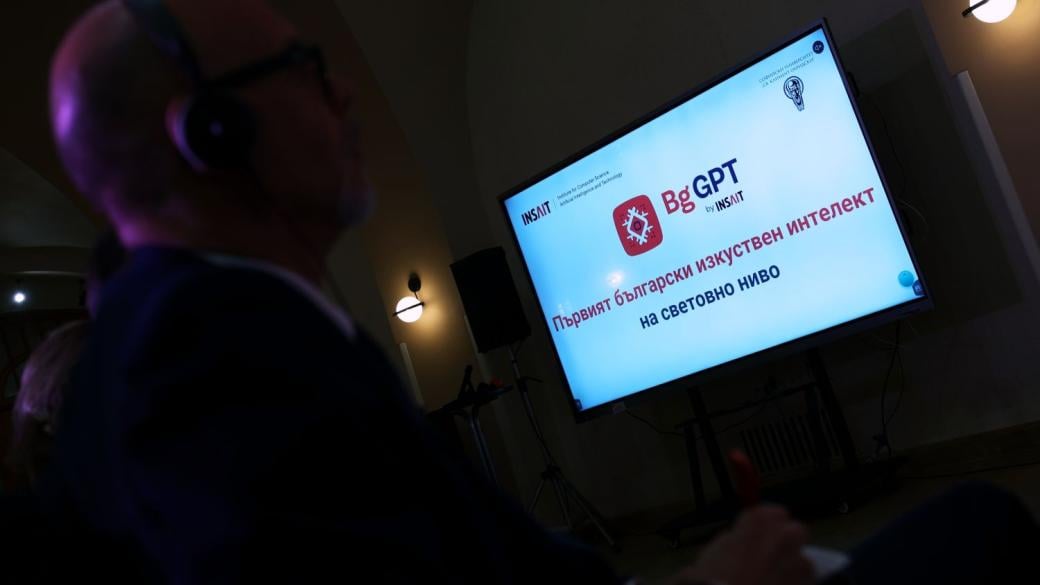BgGPT will assist in the evaluation of public procurement
Automation will reduce the time needed to perform procedural checks by nearly 80%

© ECONOMIC.BG / BTA
Public procurement in Bulgaria will undergo another level of automation with the help of BgGPT – the first open language model adapted to the Bulgarian language, created by the Institute of Computer Science, Artificial Intelligence and Technologies (INSAIT).
This is clear from the responses received by Economic.bg from the Council of Ministers Administration (CMA) to questions sent under the Access to Public Information Act (APIA).
They indicate that since 2022, automation of assessments has been introduced in the Information System for Management and Monitoring of EU Funds in Bulgaria (ISUN). The current level allows “the system to automatically assign points according to specific criteria from the technical and financial evaluation of project proposals based on pre-set formulas.”
It appears that the next planned step in this direction is related to criteria that require analysis and processing of text and information from attached files.
The system's capabilities in this regard are great, given that most of the application data is available in a structured form and in precisely defined fields in ISUN, which facilitates its processing by a language model," say officials from the Council of Ministers Administration.
They add that “the BgGPT language model is currently being developed and trained to support the project proposal evaluation process.” According to initial estimates by the AMS, automation will reduce the time needed to check procedures by nearly 80%.
We would like to remind you that the news was first announced by Deputy Prime Minister and Minister of Innovation and Growth Tomislav Donchev, who said during an event in mid-July that the Ministry was working with INSAIT to automate two systems – some of the functions within the ministry and the ISUN system.
“Our goal is to automate the evaluation of public procurement,” Donchev said at the time.
Who pays
When asked what the budget for automation is and where the funds will come from, the AMS said that the Central Coordination Unit (CCU), which is responsible for the task, is working with INSAIT on the project.
Current activities are being carried out within the official competences of experts from the aforementioned organizations, and no additional financial resources are planned," they specified.
How transparency will be ensured
Economic.bg also inquired about how exactly the transparency of the process would be ensured if it became automated. The AMS explained that all processes related to European funds are currently subject to regular audit and control. This includes ISUN and the algorithms for its operation.
Currently, each applicant in the procedures has access to the way in which their project proposal has been evaluated – to the evaluation table applicable at the various stages, the points awarded, and the evaluators' comments on each criterion.
This approach will be maintained regardless of whether the evaluation is automated or not.
The principle of publicity and transparency is paramount, with automation being only a tool to speed up and improve the evaluation process, but the responsibility for the lawful application of the criteria lies with the organizations responsible for managing the funds," the AMS emphasizes.
How automated decisions will be appealed
Currently, applicants can challenge decisions to grant non-repayable financial assistance (NFA) if their project proposal is rejected. If the objection is found to be justified, the application is re-evaluated.
No change is planned in the applicable legislation, which currently allows decisions on the granting of BFP to be appealed under the Administrative Procedure Code before the relevant administrative court," the administration said.
Will there be job cuts?
When asked whether job cuts are possible due to the introduction of artificial intelligence, the AMS reassures that one does not necessarily lead to the other.
“Language models are just one technological solution among all the possible tools and approaches for process optimization, which does not mean job cuts, but rather the reallocation of saved resources to tasks where they can create additional added value,” they say.
When will the final product be ready?
The process of implementing artificial intelligence is ongoing, and AMS has not committed to saying when the first public procurement evaluated by artificial intelligence can be expected.
Currently, the possibilities are being analyzed and the business processes are being described for the specific functionalities for the implementation of artificial intelligence in the process of evaluating the procedures for selecting a contractor under the procedure of Council of Ministers Decree No. 4 of 2024. for determining the rules for reviewing and evaluating bids and concluding contracts in the selection procedure with a public call by beneficiaries of non-repayable financial assistance from the ESF (public procurement)," was the specific response from the ministry.
Translated with DeepL.

 Simona Gotsova
Simona Gotsova